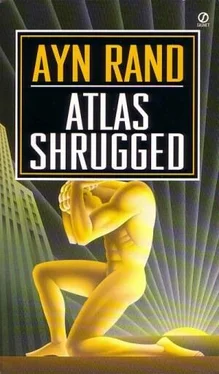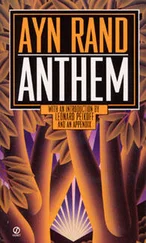"I've changed my mind," said Galt. "There is somebody I'd like to speak to."
"Who?" cried Mr. Thompson eagerly.
"Dr. Robert Stadler."
Mr. Thompson emitted a long whistle and shook his head apprehensively. "That one is no friend of yours," he said in a tone of honest warning.
"He's the one I want to see."
"Okay, if you wish. If you say so. Anything you wish. I'll have him here tomorrow morning."
That evening, dining with Wesley Mouch in his own suite, Mr. Thompson glared angrily at a glass of tomato juice placed before him. "What?
No grapefruit juice?" he snapped; his doctor had prescribed grapefruit juice as protection against an epidemic of colds.
"No grapefruit juice," said the waiter, with an odd kind of emphasis.
"Fact is," said Mouch bleakly, "that a gang of raiders attacked a train at the Taggart Bridge on the Mississippi. They blew up the track and damaged the bridge. Nothing serious. It's being repaired—but all traffic is held up and the trains from Arizona can't get through."
"That's ridiculous! Aren't there any other—?" Mr. Thompson stopped; he knew that there were no other railroad bridges across the Mississippi.
After a moment, he spoke up in a staccato voice. "Order army detachments to guard the bridge. Day and night. Tell them to pick their best men for it. If anything happened to that bridge—"
He did not finish; he sat hunched, staring down at the costly china plates and the delicate hors d'oeuvres before him. The absence of so prosaic a commodity as grapefruit juice had suddenly made real to him, for the first time, what it was that would happen to the city of New York if anything happened to the Taggart Bridge.
"Dagny," said Eddie Willers, that evening, "the bridge is not the only problem." He snapped on her desk lamp which, in forced concentration on her work, she had neglected to turn on at the approach of dusk.
"No transcontinental trains can leave San Francisco. One of the fighting factions out there—I don't know which one—has seized our terminal and imposed a 'departure tax' on trains. Meaning that they're holding trains for ransom. Our terminal manager has quit. Nobody knows what to do there now."
"I can't leave New York," she answered stonily.
"I know," he said softly. "That's why it's 7 who'll go there to straighten things out. At least, to find a man to put in charge.”
"No! I don't want you to. It's too dangerous. And what for? It doesn't matter now. There's nothing to save."
"It's still Taggart Transcontinental. I'll stand by it, Dagny, wherever you go, you'll always be able to build a railroad. I couldn't. I don't even want to make a new start. Not any more. Not after what I've seen. You should. I can't. Let me do what I can."
"Eddie! Don't you want—" She stopped, knowing that it was useless.
"All right, Eddie. If you wish."
"I'm flying to California tonight. I've arranged for space on an army plane. . . . I know that you will quit as soon as . . . as soon as you can leave New York. You might be gone by the time I return. When you're ready, just go. Don't worry about me. Don't wait to tell me. Go as fast as you can. I . . . I'll say good-bye to you, now."
She rose to her feet. They stood facing each other; in the dim half light of the office, the picture of Nathaniel Taggart hung on the wall between them. They were both seeing the years since- that distant day when they had first learned to walk down the track of a railroad. He inclined his head and held it lowered for a long moment.
She extended her hand. "Good-bye, Eddie."
He clasped her hand firmly, not looking down at his fingers; he was looking at her face.
He started to go, but stopped, turned to her and asked, his voice low, but steady, neither as plea nor as despair, but as a last gesture of conscientious clarity to close a long ledger, "Dagny . . . did you know . . . how I felt about you?"
"Yes," she said softly, realizing in this moment that she had known it wordlessly for years, "I knew it."
"Good-bye, Dagny."
The faint rumble of an underground train went through the walls of the building and swallowed the sound of the door closing after him.
It was snowing, next morning, and melting drops were like an icy, cutting touch on the temples of Dr. Robert Stadler, as he walked down the long corridor of the Wayne-Falkland Hotel, toward the door of the royal suite. Two husky men walked by his sides; they were from the department of Morale Conditioning, but did not trouble to hide what method of conditioning they would welcome a chance to employ, "Just remember Mr. Thompson's orders," one of them told him contemptuously. "One wrong squawk out of you—and you'll regret it, brother."
It was not the snow on his temples—thought Dr. Stadler—it was a burning pressure, it had been there since that scene, last night, when he had screamed to Mr. Thompson that he could not see John Galt. He had screamed in blind terror, begging a circle of impassive faces not to make him do it, sobbing that he would do anything but that. The faces had not condescended to argue or even to threaten him; they had merely given him orders. He had spent a sleepless night, telling himself that he would not obey; but he was walking toward that door. The burning pressure on his temples and the faint, dizzying nausea of unreality came from the fact that he could not recapture the sense of being Dr. Robert Stadler.
He noticed the metallic gleam of the bayonets held by the guards at the door, and the sound of a key being turned in a lock. He found himself walking forward and heard the door being locked behind him.
Across the long room, he saw John Galt sitting on the window sill, a tall, slender figure in slacks and shirt, one leg slanting down to the floor, the other bent, his hands clasping his knee, his head of sun-streaked hair raised against a spread of gray sky—and suddenly Dr. Stadler saw the figure of a young boy sitting on the porch-railing of his home, near the campus of the Patrick Henry University, with the sun on the chestnut hair of a head lifted against a spread of summer blue, and he heard the passionate intensity of his own voice saying twenty-two years ago: "The only sacred value in the world, John, is the human mind, the inviolate human mind . . ." —and he cried to that boy's figure, across the room and across the years: "I couldn't help it, John! I couldn't help it!"
He gripped the edge of a table between them, for support and as a protective barrier, even though the figure on the window sill had not moved.
"I didn't bring you to this!" he cried. "I didn't mean to! I couldn't help it! It's not what I intended! . . . John! I'm not to blame for it!
I'm not! I never had a chance against them! They own the world! They left me no place in it! . . . What's reason to them? What's science?
You don't know how deadly they are! You don't understand them! They don't think! They're mindless animals moved by irrational feelings—by their greedy, grasping, blind, unaccountable feelings! They seize whatever they want, that's all they know: that they want it, regardless of cause, effect or logic—they want it, the bloody, grubbing pigs! . . . The mind? Don't you know how futile it is, the mind, against those mindless hordes? Our weapons are so helplessly, laughably childish: truth, knowledge, reason, values, rights! Force is all they know, force, fraud and plunder! . , , John! Don't look at me like that! What could I do against their fists? I had to live, didn't I? It wasn't for myself—it was for the future of science! I had to be left alone, I had to be protected, I had to make terms with them—there's no way to live except on their terms—there isn't!—do you hear me?—there isn't! . . . What did you want me to do? Spend my life begging for jobs? Begging my inferiors for funds and endowments? Did you want my work to depend on the mercy of the ruffians who have a knack for making money? I had no time to compete with them for money or markets or any of their miserable material pursuit! Was that your idea of justice—that they should spend their money on liquor, yachts and women, while the priceless hours of my life were wasted for lack of scientific equipment? Persuasion? How could I persuade them? What language could I speak to men who don't think? . . . You don't know how lonely I was, how starved for some spark of intelligence! How lonely and tired and helpless! Why should a mind like mine have to bargain with ignorant fools?
Читать дальше










